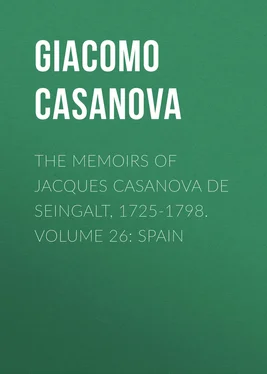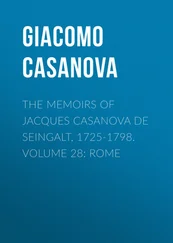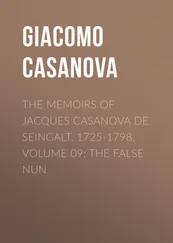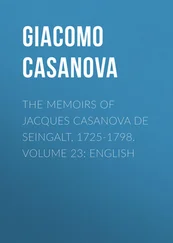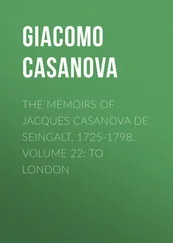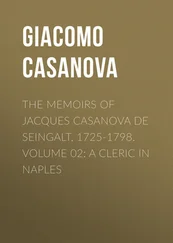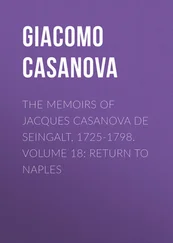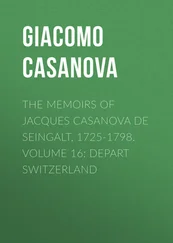Giacomo Casanova - The Memoirs of Jacques Casanova de Seingalt, 1725-1798. Volume 26 - Spain
Здесь есть возможность читать онлайн «Giacomo Casanova - The Memoirs of Jacques Casanova de Seingalt, 1725-1798. Volume 26 - Spain» — ознакомительный отрывок электронной книги совершенно бесплатно, а после прочтения отрывка купить полную версию. В некоторых случаях можно слушать аудио, скачать через торрент в формате fb2 и присутствует краткое содержание. Жанр: Биографии и Мемуары, История, foreign_edu, foreign_antique, foreign_prose, на английском языке. Описание произведения, (предисловие) а так же отзывы посетителей доступны на портале библиотеки ЛибКат.
- Название:The Memoirs of Jacques Casanova de Seingalt, 1725-1798. Volume 26: Spain
- Автор:
- Жанр:
- Год:неизвестен
- ISBN:нет данных
- Рейтинг книги:3 / 5. Голосов: 1
-
Избранное:Добавить в избранное
- Отзывы:
-
Ваша оценка:
- 60
- 1
- 2
- 3
- 4
- 5
The Memoirs of Jacques Casanova de Seingalt, 1725-1798. Volume 26: Spain: краткое содержание, описание и аннотация
Предлагаем к чтению аннотацию, описание, краткое содержание или предисловие (зависит от того, что написал сам автор книги «The Memoirs of Jacques Casanova de Seingalt, 1725-1798. Volume 26: Spain»). Если вы не нашли необходимую информацию о книге — напишите в комментариях, мы постараемся отыскать её.
The Memoirs of Jacques Casanova de Seingalt, 1725-1798. Volume 26: Spain — читать онлайн ознакомительный отрывок
Ниже представлен текст книги, разбитый по страницам. Система сохранения места последней прочитанной страницы, позволяет с удобством читать онлайн бесплатно книгу «The Memoirs of Jacques Casanova de Seingalt, 1725-1798. Volume 26: Spain», без необходимости каждый раз заново искать на чём Вы остановились. Поставьте закладку, и сможете в любой момент перейти на страницу, на которой закончили чтение.
Интервал:
Закладка:
"Not at all. If I were a pretty woman with the like defect I should take care to avoid all words with an 'r; in them."
"Oh, that would be too much trouble."
"Let us bet again, for a box or a kiss, that you can spend a whole day without using an 'r'. Let us begin now."
"All in good time," said she, "but we won't have any stake, as I think you are too greedy."
The author came to dinner, and was duly attacked by Madame Vestri. She began by saying that it was an author's duty to be polite to actresses, and if any of them spoke with a lisp the least he could do was to write their parts without the fatal letter.
The young author laughed, and said it could not be done without spoiling the style. Thereupon Madame Vestri gave him my version of her part, telling him to read it, and to say on his conscience whether the style had suffered. He had to confess that my alterations were positive improvements, due to the great richness of the French language. And he was right, for there is no language in the world that can compare in copiousness of expression with the French.
This trifling subject kept us merry, but Madame Vestri expressed a devout wish that all authors would do for her what I had done. At Paris, where I heard her playing well and lisping terribly, she did not find the authors so obliging, but she pleased the people. She asked me if I would undertake to recompose Zaire, leaving out the r's.
"Ah!" said I, "considering that it would have to be in verse, and inVoltairean verse, I would rather not undertake the task."
With a view to pleasing the actress the young author asked me how I would tell her that she was charming without using an 'r'.
"I should say that she enchanted me, made me in an ecstasy, that she is unique."
She wrote me a letter, which I still keep, in which the 'r' does not appear. If I could have stayed at Stuttgart, this device of mine might have won me her favours; but after a week of feasting and triumph the courier came one morning at ten o'clock and announced that his highness, the duke, would arrive at four.
As soon as I heard the news I told Baletti with the utmost coolness that I thought it would be only polite to meet my lord, and swell his train on his entry into Louisburg; and as I wished to meet him at a distance of two stages I should have to go at once. He thought my idea an excellent one, and went to order post-horses immediately; but when he saw me packing up all my belongings into my trunk, he guessed the truth and applauded the jest. I embraced him and confessed my hardihood. He was sorry to lose me, but he laughed when he thought of the feelings of the duke and of the three officers when they found out the trick. He promised to write to me at Mannheim, where I had decided on spending a week to see my beloved Algardi, who was in the service of the Elector. I had also letters for M. de Sickirigen and Baron Becker, one of the Elector's ministers.
When the horses were put in I embraced Baletti, his little girl, and his pretty housekeeper, and ordered the postillion to drive to Mannheim.
When we reached Mannheim I heard that the Court was at Schwetzingen, and I bade the postillion drive on. I found everyone I had expected to see. Algardi had got married, M. de Sickingen was soliciting the position of ambassador to Paris, and Baron Becker introduced me to the Elector. Five or six days after my arrival died Prince Frederic des Deux Ponts, and I will here relate an anecdote I heard the day before he died.
Dr. Algardi had attended on the prince during his last illness. I was supping with Veraci, the poet-laureate, on the eve of the prince's death, and in the course of supper Algardi came in.
"How is the prince?" said I.
"The poor prince—he cannot possibly live more than twenty-four hours."
"Does he know it?"
"No, he still hopes. He grieved me to the heart by bidding me tell him the whole truth; he even bade me give my word of honour that I was speaking the truth. Then he asked me if he were positively in danger of death."
"And you told him the truth?"
"Certainly not. I told him his sickness was undoubtedly a mortal one, but that with the help of nature and art wonders might be worked."
"Then you deceived him, and told a lie?"
"I did not deceive him; his recovery comes under the category of the possible. I did not want to leave him in despair, for despair would most certainly kill him."
"Yes, yes; but you will confess that you told him a lie and broke your word of honour."
"I told no lie, for I know that he may possibly be cured."
"Then you lied just now?"
"Not at all, for lie will die to-morrow."
"It seems to me that your reasoning is a little Jesuitical."
"No, it is not. My duty was to prolong my patient's life and to spare him a sentence which would most certainly have shortened it, possibly by several hours; besides, it is not an absolute impossibility that he should recover, therefore I did not lie when I told him that he might recover, nor did I lie just now when I gave it as my opinion (the result of my experience) that he would die to-morrow. I would certainly wager a million to one that he will die to-morrow, but I would not wager my life."
"You are right, and yet for all that you deceived the poor man; for his intention in asking you the question was not to be told a commonplace which he knew as well as you, but to learn your true opinion as to his life or death. But again I agree with you that as his physician you were quite right not to shorten his few remaining hours by telling him the terrible truth."
After a fortnight I left Schwetzingen, leaving some of my belongings under the care of Veraci the poet, telling him I would call for them some day; but I never came, and after a lapse of thirty-one years Veraci keeps them still. He was one of the strangest poets I have ever met. He affected eccentricity to make himself notorious, and opposed the great Metastasio in everything, writing unwieldy verses which he said gave more scope for the person who set them to music. He had got this extravagant notion from Jumelli.
I traveled to Mayence and thence I sailed to Cologne, where I looked forward to the pleasure of meeting with the burgomaster's wife who disliked General Kettler, and had treated me so well seven years ago. But that was not the only reason which impelled me to visit that odious town. When I was at Dresden I had read in a number of the Cologne Gazette that "Master Casanova has returned to Warsaw only to be sent about his business again. The king has heard some stories of this famous adventurer, which compel him to forbid him his Court."
I could not stomach language of this kind, and I resolved to pay Jacquet, the editor, a visit, and now my time had come.
I made a hasty dinner and then called on the burgomaster, whom I found sitting at table with his fair Mimi. They welcomed me warmly, and for two hours I told them the story of my adventures during the last seven years. Mimi had to go out, and I was asked to dine with them the next day.
I thought she looked prettier than ever, and my imagination promised me some delicious moments with her. I spent an anxious and impatient night, and called on my Amphitryon at an early hour to have an opportunity of speaking to his dear companion. I found her alone, and began with an ardent caress which she gently repelled, but her face froze my passion in its course.
"Time is an excellent doctor," said she, "and it has cured me of a passion which left behind it the sting of remorse."
"What! The confessional . . . ."
"Should only serve as a place wherein to confess our sins of the past, and to implore grace to sin no more."
"May the Lord save me from repentance, the only source of which is a prejudice! I shall leave Cologne to-morrow."
"I do not tell you to go."
Читать дальшеИнтервал:
Закладка:
Похожие книги на «The Memoirs of Jacques Casanova de Seingalt, 1725-1798. Volume 26: Spain»
Представляем Вашему вниманию похожие книги на «The Memoirs of Jacques Casanova de Seingalt, 1725-1798. Volume 26: Spain» списком для выбора. Мы отобрали схожую по названию и смыслу литературу в надежде предоставить читателям больше вариантов отыскать новые, интересные, ещё непрочитанные произведения.
Обсуждение, отзывы о книге «The Memoirs of Jacques Casanova de Seingalt, 1725-1798. Volume 26: Spain» и просто собственные мнения читателей. Оставьте ваши комментарии, напишите, что Вы думаете о произведении, его смысле или главных героях. Укажите что конкретно понравилось, а что нет, и почему Вы так считаете.
